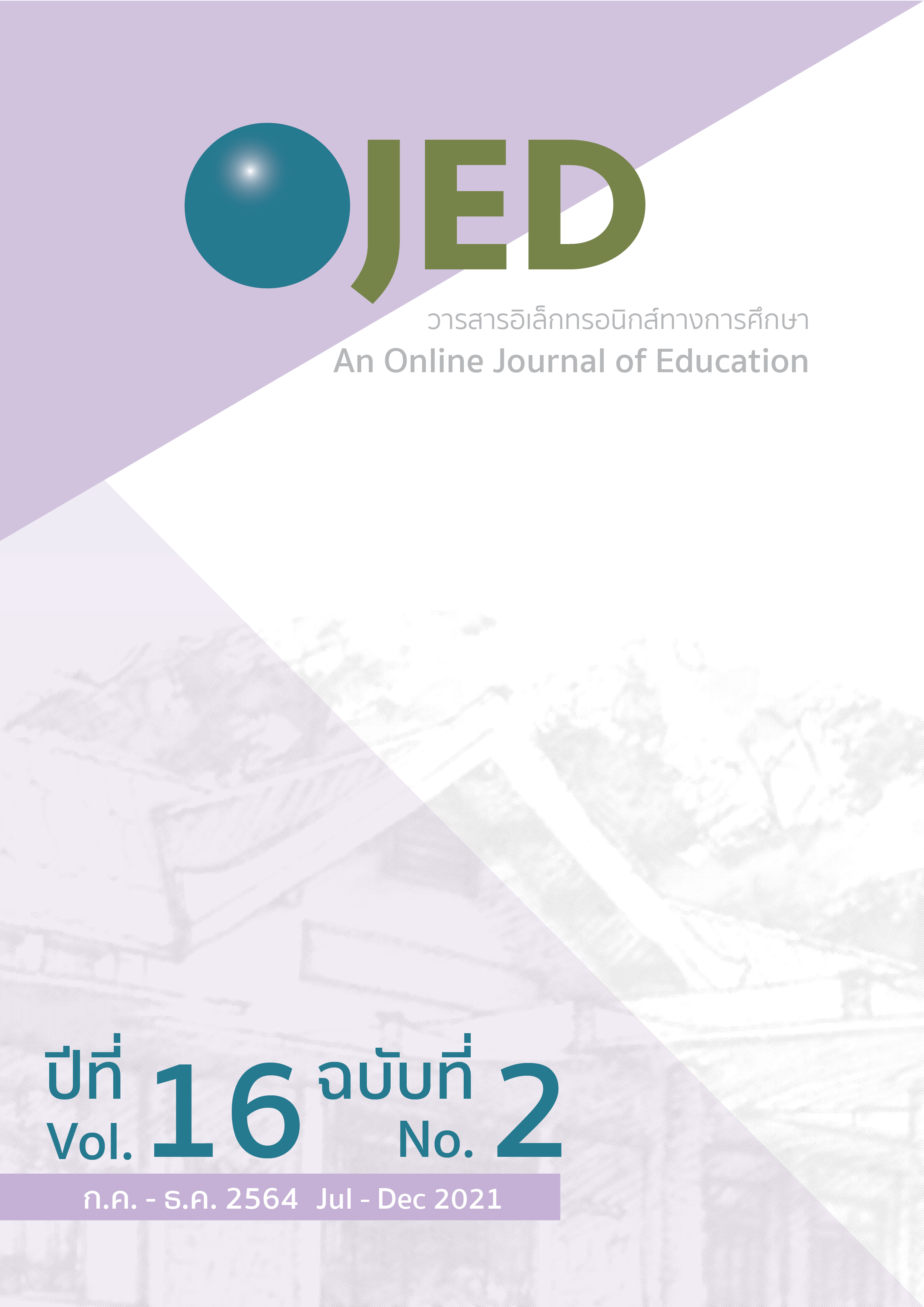Parents’ Roles in Promoting Play for Preschoolers in Bangkok
DOI:
https://doi.org/10.14456/ojed.2021.22Keywords:
parents’ roles, play, preschoolers, parents’ role in promoting playAbstract
The purposes of this research were to study preschoolers’ characteristic of play and parents’ role in promoting play for preschoolers in Bangkok in 2 aspects comprised of 1) organizing play environment and 2) supporting play. Samples were 432 parents of preschoolers aged 3-6 years in schools located in Bangkok area under 4 offices which were schools under the Bangkok Education Bureau, the Office of the Basic Education Commission, the Office of the Private Education Commission and the Office of the Higher Education Commission. Questionnaires was used to elicit data and then analyzed by using frequency, percentage, mean, standard deviation, and content analysis. The research findings found 3 modes of preschoolers’ play which were 1) intellectual play—the highest score was constructive play (98.5%), 2) physical play—the highest score was fine motor play (97%) and 3) social play—the highest score was associative play (83.9%). Parents’ roles in promoting play for preschoolers were at a high level (M = 4.10). Supporting play was a highest mean score (M= 4.32), followed by organizing play environment (M = 3.88).
References
กรมสุขภาพจิต กระทรวงสาธารณสุข. (2552). คู่มือผู้ปกครองใส่ใจวัยเรียน. กรมสุขภาพจิต ราชานุกูล.
http://rajanukul.go.th/main/_admin/images/downloadlist/D0000047.pdf
เข็มพร วิรุณราพันธ์. (2561, 20 มีนาคม). เรียนรู้ด้วยการเล่น. ไทยพีบีเอส. https://www.citizenthaipbs.net/node/22741
ชุลีพร พิศุทธิ์ศุภฤทธิ์. (2537). การศึกษาความสามารถในการสังเกตของเด็กปฐมวัยที่ผู้ปกครองใช้ชุดส่งเสริมความรู้แก่ผู้ปกครอง “ชวนคุย ชวนร้อง ชวนเล่น”. [ปริญญานิพนธ์การศึกษามหาบัณฑิต ไม่ได้ตีพิมพ์]. มหาวิทยาลัยศรีนครินทรวิโรฒ.
ณัฐธนีย์ ลิ้มวัฒนาพันธ์. (2563, 13 สิงหาคม). เด็กจะเล่นอย่างไรให้สนุกเเละคลายความเศร้าในใจได้โดยมีผู้ใหญ่เป็นนักสังเกตการณ์. The potential. https://thepotential.org/family/productive-play/
นภเนตร ธรรมบวร. (2544). การพัฒนากระบวนการคิดในเด็กปฐมวัย. สํานักพิมพ์แห่งจุฬาลงกรณ์มหาวิทยาลัย.
ประเสริฐ ผลิตผลการพิมพ์. (2562, 12 มีนาคม). อ่าน เล่น ทำงาน: เพื่อคำว่า ‘ความสำเร็จ’ เราทำอะไรกันอยู่. The potential. https://thepotential.org/2019/04/09/ef-and-education-18/
พิมลพรรณ อิศรภักดี. (2560). ลักษณะครอบครัวไทยเปลี่ยนไปอย่างไรในกว่า 20 ปีที่ผ่านมา. ประชากรและการพัฒนา, 37(4), 1-2.
วรรณี เตชะรัตนประเสริฐ. (2558). เลี้ยงลูกด้วยหัวใจ. ริช.
สำนักงานกองทุนสนับสนุนการเสริมสร้างสุขภาพ. (2562). สิ่งเล็ก ๆ ที่สร้างลูก. Thai health.https://drive.google.com/file/d/1nTnuV-0u52DVEBJC4YXBqcAtNExSAF5S/view
สำนักงานกองทุนสนับสนุนการเสริมสร้างสุขภาพ. (2563). จับตาทิศทางสุขภาพคนไทย ปี 2563. Thai health. https://resourcecenter.thaihealth.or.th/files/90/จับตา%2010%20พฤติกรรมสุขภาพคนไทย%20ปี%2063.pdf
Bowman, B. T. (2018, November 15). Free play and structured play are both key to childhood development. The season. http://theseason.gc.com/community-free-play-and-structured-play-are-both-key-to-childhood-development
Brown, S., & Vaughan, C. (2009). Play: How it shapes the brain, opens the imagination, and invigorates the soul. Penguin Group.
Harvard Health. (2021). Coronavirus outbreak and kids. Harvard health publishing.https://www.health.harvard.edu/diseases-and-conditions/coronavirus-outbreak-and-kids
Johnson, J. M., Christie, J. A., & Yawkey, T. D. (1999). Play and early childhood development. Longman.
Myers, R. (2019). The well-balanced family: Reduce screen time and increase family fun, fitness and connectedness. Book Baby.
Pearce, J. C., & Mendizza, M. (2003). Magical parent - magical child, the optimum learning relationship. In-Joy.
Real play coalition. (2018). Value of play report. Real play coalition.
Wisner, W. (2021). Is it safe for children to be playing outside during COVID-19?. Very well family. https://www.verywellfamily.com/is-it-safe-for-kids-to-play-outside-during-covid-19-5091660
Downloads
Published
How to Cite
Issue
Section
License
Copyright (c) 2021 An Online Journal of Education

This work is licensed under a Creative Commons Attribution-NonCommercial-NoDerivatives 4.0 International License.




